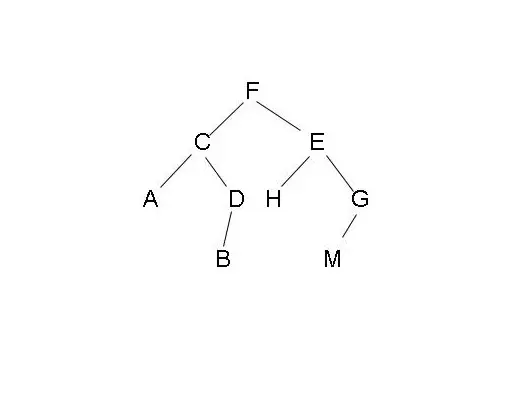二叉树线索化最简单的就是中序了,无脑按照中序遍历递归算法套就OK了。
现在我们有如下代码实现- //file:threadBiTree.h
- #ifndef THREAD_BI_TREE_H
- #define THREAD_BI_TREE_H
- typedef struct threadBiNode {
- int data;
- struct threadBiNode *lchild, *rchild;
- int ltag, rtag;
- }threadBiNode, *threadBiTree;
- void _thread_in(threadBiTree &T, threadBiNode *&pre);
- void create_thread_in(threadBiTree &T);
- #endif
- /**********************/
- //file:threadBiTree.cpp
- #include "threadBiTree.h"
- void _thread_in(threadBiTree &T, threadBiNode *&pre)
- {
- if (!T)
- return;
- _thread_in(T->lchild, pre);
- if (pre && pre->rchild == nullptr)
- {
- pre->rtag = 1;
- pre->rchild = T;
- }
- if (T->lchild == nullptr)
- {
- T->ltag = 1;
- T->lchild = pre;
- }
- pre = T;
- _thread_in(T->rchild, pre);
- }
- //assume that the tags of tree have been initialize by zero
- void create_thread_in(threadBiTree &T)
- {
- if (!T)
- return;
- threadBiNode *pre = nullptr;
- _thread_in(T, pre);
- if (pre)
- {
- pre->rtag = 1;
- pre->rchild = nullptr;
- }
- }
于是我们有如下辅助函数和用于正反向中序遍历的函数- //file: threadBiTree.cpp
- /**********用于正向中序遍历**********/
- // assume that the data structure is validate
- threadBiNode *first_thread_in(threadBiTree &T)
- {
- if (!T)
- return nullptr;
- threadBiNode *p = T;
- while (p->ltag == 0) //中序下第一个节点必然是整棵树最左下节点
- p = p->lchild;
- return p;
- }
- // assume that the data structure is validate
- threadBiNode *next_thread_in(threadBiNode *&p)
- {
- if (!p)
- return nullptr;
- if (p->rtag == 1) //某个节点的后继要么是由其后继指针指定(即无右子树)
- return p->rchild;
- else
- return first_thread_in(p->rchild); //要么是其右子树在中序下的第一个节点,简单理解为因为中序是LNR,现在存在右子树那就是R了,另外中序遍历是递归的
- }
- // assume that the data structure is validate
- void traverse_thread_in(threadBiTree &T, void (*visit)(threadBiNode *&p))
- {
- for (threadBiNode *p = first_thread_in(T); p != nullptr; p = next_thread_in(p))
- visit(p);
- }
- /**********用于逆向中序遍历**********/
- // assume that the data structure is validate
- threadBiNode *last_thread_in(threadBiTree &T)
- {
- if (!T)
- return nullptr;
- threadBiNode *p = T;
- while (p->rtag == 0) //中序下最后一个节点必然是整棵树最右下节点
- p = p->rchild;
- return p;
- }
- // assume that the data structure is validate
- threadBiNode *previous_thread_in(threadBiNode *&p)
- {
- if (!p)
- return nullptr;
- if (p->ltag == 1) //前驱就往左子树上找,和找后继原理是一样的,无左子树则其前驱为该节点左线索所指明的节点
- return p->lchild;
- else
- return last_thread_in(p->lchild); //有左子树,前驱就是左子树中序遍历下的最后一个节点
- }
- // assume that the data structure is validate
- void traverse_reverse_thread_in(threadBiTree &T, void (*visit)(threadBiNode *&p))
- {
- for (threadBiNode *p = last_thread_in(T); p != nullptr; p = previous_thread_in(p))
- visit(p);
- }
于是我们有如下二叉树后序线索化实现- /******postorder thread******/
- // cannot be called by user
- void _thread_post(threadBiTree &T, threadBiNode *&pre)
- {
- if (!T)
- return;
- _thread_post(T->lchild, pre);
- _thread_post(T->rchild, pre);
- if (T->lchild == nullptr)
- {
- T->ltag = 1;
- T->lchild = pre;
- }
- if (pre && pre->rchild == nullptr)
- {
- pre->rtag = 1;
- pre->rchild = T;
- }
- pre = T;
- }
- // assume that the tags of tree have been initialize by zero
- void create_thread_post(threadBiTree &T)
- {
- if (!T)
- return;
- threadBiNode *pre = nullptr;
- _thread_post(T, pre);
- if (pre && pre->rchild == nullptr) //如果最后一个结点右指针确实为空那么可以设其为线索
- {
- pre->rtag = 1;
- }
- }
最后一个就是前序二叉树线索化,前序二叉树线索化需要注意的就是避免某个结点被重复线索化,因为前序遍历的特点,必定是根先被线索化。可以这样想某个前序线索化到某个节点后,直接调用前序线索化函数,如果左指针是线索,那么就开始处理之前已经线索化的结点。试想,如果采用中序、后序类似的代码而不对函数递归调用作出限制,那么至少会产生无限递归的问题,例如我们可以考虑对图中对节点A的线索化

所以,限制以下递归调用的条件会产生正确结果,从而我们有如下二叉树先序线索化实现- //file: threadBiTree.cpp
- /******preorder thread******/
- // cannot be called by user
- void _thread_pre(threadBiTree &T, threadBiNode *&pre)
- {
- if (!T)
- return;
- if (pre && pre->rchild == nullptr)
- {
- pre->rtag = 1;
- pre->rchild = T;
- }
- if (T->lchild == nullptr)
- {
- T->ltag = 1;
- T->lchild = pre;
- }
- pre = T;
- if (T->ltag == 0) // 若已经线索化再次进入则会因为指针不空再次被线索化所以当未被线索化才递归执行线索化
- _thread_pre(T->lchild, pre);
- if (T->rtag == 0)
- _thread_pre(T->rchild, pre);
- }
- // assume that the tags of tree have been initialize by zero
- void create_thread_pre(threadBiTree &T)
- {
- if (!T)
- return;
- threadBiNode *pre = nullptr;
- _thread_pre(T, pre);
- if (pre && pre->rchild == nullptr)
- {
- pre->rtag = 1;
- pre->rchild = nullptr;
- }
- }
- //file: threadBiTree.cpp
- /**********用于正向中序遍历**********/
- // assume that the data structure is validate
- threadBiNode *first_thread_pre(threadBiTree &T) {
- return T;
- }
- // assume that the data structure is validate
- threadBiNode *next_thread_pre(threadBiNode *&p) {
- if(!p)
- return nullptr;
- threadBiNode *q = p;
- if(q->ltag == 0)
- return q->lchild;
- else
- return q->rchild;
- }
- // assume that the data structure is validate
- void traverse_thread_pre(threadBiTree &T, void (*visit)(threadBiNode *&p)) {
- for(threadBiNode *p = first_thread_pre(T); p != nullptr; p = next_thread_pre(p))
- visit(p);
- }
免责声明:如果侵犯了您的权益,请联系站长,我们会及时删除侵权内容,谢谢合作! |